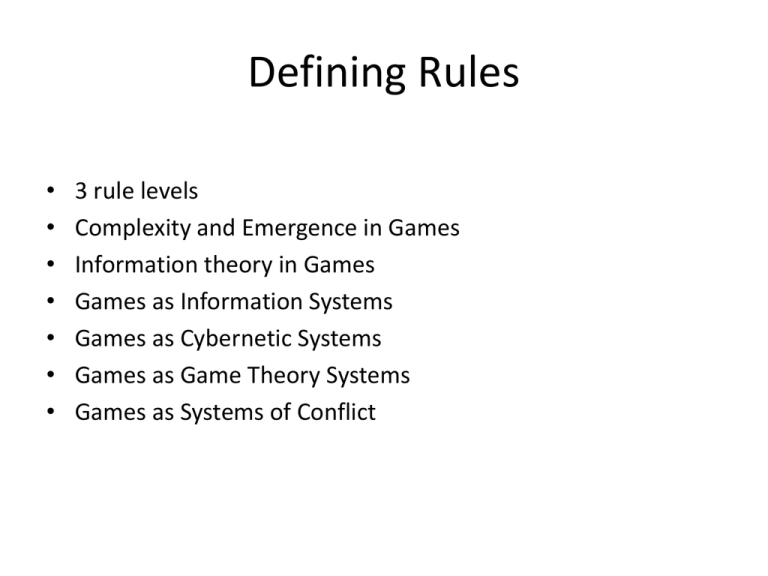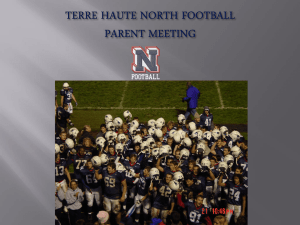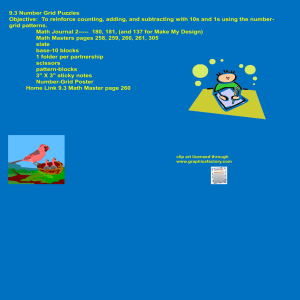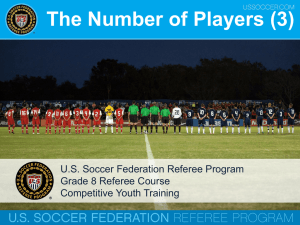Breaking the Rules
advertisement

Defining Rules • • • • • • • 3 rule levels Complexity and Emergence in Games Information theory in Games Games as Information Systems Games as Cybernetic Systems Games as Game Theory Systems Games as Systems of Conflict Breaking the Rules (Ch. 21) Prof. Hector Munoz-Avila Introduction • Goldstein suggests two kinds of rules: ideal versus actual rules of play – Examples: “einee-meenie-minee-moe” “no attack for 10-minutes” rule in an RTS • DeKoven: to win, players may violate rules • We now examine: how and why players cheat or “bend the rules” Categories of Player versus Dimensions • Dimensions – Adherence to the rules – Interest in winning – Degree of lusory attitude • Types of player – – – – – Standard player Dedicated player Unsportmanslike player Cheater Spoil-sport • Cheating to win its obvious, but examples of cheating for “fun” in the game? • What about having fun at the expense of possibly loosing? Standard Players • Follow the rules of the game (explicit and implicit) • Has a lusory attitude • He/she tries to win the game • Typically game designer is thinking about this kind of players as their target population • Book asserts that the majority of players are in this class Dedicated Players • • • • Master rules High-level of lusory attitude Winning is very important Standard players might not find enjoyable level of commitment to play the game that dedicated players exhibit Unsportmanlike Players • Tries to exploit the rules – Even violate implicit rules – Follow operational rules but in a way that violate intend of the rules – Example • Lusory attitude – High as long as it serves to win the game – Low if it serves to win the game • Winning is very important • Try to find “Degenerate Strategies” Degenerate Strategies • Exploits due to loopholes in the rules – Or bad implementation of the rules (e.g., in digital games) – Example • May result (“emergence”) as a result of complex system (Games as complex systems) • May be a saddle points in space of possible game states (Games as Game Theory systems) – Sometimes it is needed because of game design (flaw) Cheater • Breaks operational rules • But trying not to be caught • Because he/she still wants to win the game – So it does not destroy the game (unless caught) – Example Spoil-Sport • • • • Denies the operational rules Doesn’t really care about winning No lusory attitude Considered more destructive/disruptive than even the cheater • Look at this Some Games are Build around RuleBreaking • Some team sports • Tactical fouls – Strategic decision to break the rules of the game • Rule-breaking is part of the game Digital Rule-Breaking • • • • • • Easter Eggs (Goro) Cheat codes Work around True cheating: hacks Spoil-sport hacks Game design rule-breaking: – test limits of system – Change rules of game and see what happens Virtual Economies Original topic by: Scott Woodward Chris Addy Adjusted by: Prof. Hector Munoz-Avila Currency as Meaningful Play Element • We observed in previous lectures that in-game currency is an integrated element of game design • “integrated” as in meaningful play: – Currency allows players to get in game items for their avatars – They can these items from other players or from NPCs – These items can be used to progress in the game towards its final objective • E.g., defeat BMM (Big Mean Monster) Economies • Economy refers to the human activities related with the production, distribution, exchange, and consumption of goods and services • A virtual economy is an economy existing in a virtual persistent world, usually in the context of a game Virtual Economies • Consist of 5 parts – Persistence – Scarcity – Specialization – Trade – Property Rights Persistence • The gaming system keeps track of – State of the world – Resources – Possessions • The gaming system maintains these possessions permanently Scarcity • More needs than available resources • Users must expend resources – Time – Real money – Virtual money and resources • To obtain goods, resources, or services (another) in the virtual environment Specialization • Availability to players must vary – Limit players ability to obtain resources based either upon skills, class, or other factors – This creates conflict in the environment for available resources – Other forms of obtaining resources? Trade • Users must be able to transfer goods and services to and from other users – Virtual objects only have meaning in context of the game – Worthless if unable to trade goods between players and the environment • Trade modalities: – Direct player versus player – Player versus NPC (NPC sellers) – Indirect player versus player: Auction House Auction House Auction House • Players can buy/sell their goods • Operates in the same way than “real” market: – Inflation – The rarity of a good influences its price • Can be strongly influenced by the “government” (i.e., the game developer): – Example of designer decision affecting the value of goods? – Example of the “real” government affecting the value of goods? Property Rights • The game must record which goods and services belong to which user’s avatar – The user may dispose of the goods or services at any time via destruction, exchange or use. – Property not limited to individual users • Guilds might also have property • An EVE Online story Games’ Genres and Their Economies – Strategy (RTS, TBS) – RPG – FPS – Board Games (Monopoly etc) – MMO • inflation Meaningful Play & Lusory Attitude • Integrated outcome – By interacting with the economy you obtain resources that will further your own goals further down the road • Player is willing to spend significant amounts of time or even real money to get those neat items Lusory Attitude • Player is willing to spend significant amounts of time or even real money to get those neat items Virtual Economies in the News • Online vendors sell currency, services or items in many online games – World of Warcraft – Everquest I & II • Arguably, Norrath was 77th economy in the world in 2005 – Second Life • EBay bans the selling of virtual goods and services • Virtual Taxation (separate from developers own “taxation”) – Becomes a game in itself – developers’ concerns






